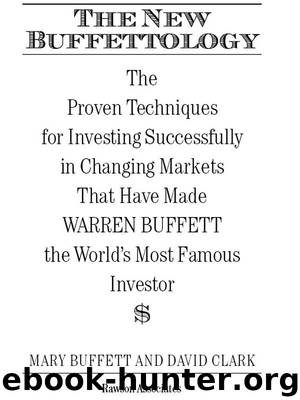The New Buffettology by Mary Buffett

Author:Mary Buffett
Language: eng
Format: epub
Publisher: Scribner
Published: 2002-03-21T05:00:00+00:00
The Dynamics of Share Repurchases
When a company spends its capital to buy back its shares, it is in effect buying its own property and increasing future per share earnings of the owners who didn’t sell. For instance, if you have a partnership with three partners, you each in effect own one-third of the partnership. If it makes any money, then each partner will take home one-third of the total. If the partnership, using partnership funds, buys one of the partners out, then the two remaining partners would each own 50% of the company and split the partnership’s future earnings fifty-fifty. The pie remains the same size, but instead of being cut into three pieces, it is now cut into just two—two bigger slices.
In the case of publicly traded companies, share repurchases will cause per share earnings to increase, which results in an increase in the market price of the stock, which means richer shareholders. Here’s how this works.
H&R Block had approximately 106 million shares outstanding in 1990 and 97 million in 2000. The decrease in the number of shares was the result of its active share-repurchase program during this period. To determine per share earnings you divide net earnings by the number of shares outstanding. In 2000, H&R Block reported net earnings of approximately $370 million, which, divided by the 97 million outstanding shares, equals per share earnings of $3.81 ($370 million ÷ 97 million = $3.81). Multiply $3.81 by a P/E ratio of 15 and you get a stock price of $57.15.
If H&R Block had not implemented a share repurchase program, it would still have had as many shares outstanding in 2000 as it did in 1990, which was 106 million, which would equate to per share earnings of $3.49 ($370 million ÷ 106 million = $3.49). Multiply $3.49 by a P/E ratio of 15 and you get a stock price of $52.35.
The bottom line here is that H&R Block’s stock repurchase program increased per share earnings by $.32 a share ($3.81 $3.49 = $.32), which caused a corresponding increase in its stock price from $52.35 a share to $57.15. H&R Block shareholders who didn’t sell their stock during this period ended up the beneficiaries of the decrease of shares outstanding; their slices of H&R Block net earnings just got bigger.
Of course none of this would be possible if H&R Block didn’t have a durable competitive advantage creating an abundance of excess cash.
Download
This site does not store any files on its server. We only index and link to content provided by other sites. Please contact the content providers to delete copyright contents if any and email us, we'll remove relevant links or contents immediately.
Rich Dad Poor Dad by Robert T. Kiyosaki(6592)
Pioneering Portfolio Management by David F. Swensen(6278)
How To Win Friends and Influence People by Dale Carnegie(4495)
The Money Culture by Michael Lewis(4185)
The Dhandho Investor by Mohnish Pabrai(3750)
The Wisdom of Finance by Mihir Desai(3726)
Liar's Poker by Michael Lewis(3436)
Fooled by Randomness: The Hidden Role of Chance in Life and in the Markets by Nassim Nicholas Taleb(3103)
The ONE Thing by Gary Keller(3057)
The Intelligent Investor by Benjamin Graham Jason Zweig(3033)
Mastering Bitcoin: Programming the Open Blockchain by Andreas M. Antonopoulos(3033)
The Psychology of Money by Morgan Housel(2947)
Rich Dad Poor Dad: What The Rich Teach Their Kids About Money - That The Poor And Middle Class Do Not! by Robert T. Kiyosaki(2946)
Investing For Dummies by Eric Tyson(2941)
How to Day Trade for a Living: Tools, Tactics, Money Management, Discipline and Trading Psychology by Andrew Aziz(2938)
How to Win Friends and Influence People by Dale Carnegie(2899)
Market Wizards by Jack D. Schwager(2689)
How to Pay Zero Taxes, 2018 by Jeff A. Schnepper(2641)
Zero Hour by Harry S. Dent Jr. & Andrew Pancholi(2641)
